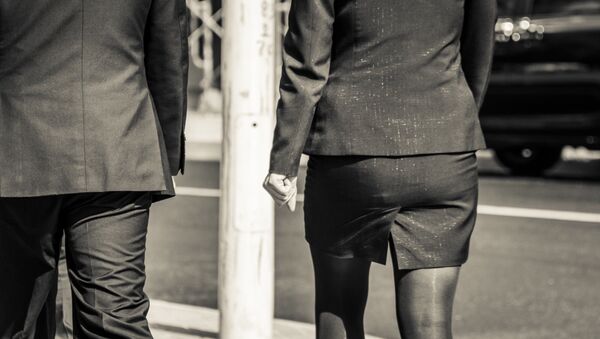The study is the largest of its kind for a generation. Cited by leading academic Dr Jane Pillinger as one of the most extensive pieces of research on sexual harassment at work in Europe.
It was carried out by YouGov and is based on the opinion of women who are working or who have ever had a job, and were happy to be surveyed, from an overall sample of British adults.
Sexual harassment is no laughing matter https://t.co/XBiXaSTpWs #harassedatwork pic.twitter.com/t5qQtc6zAM
— TradesUnionCongress (@The_TUC) August 10, 2016
Out of those surveyed the study revealed, that nearly one in three (32 percent) of women have been subject to unwelcome jokes of a sexual nature while at work more than 28 percent of women have been the subject of comments of a sexual nature about their body or clothes at work nearly 23 percent of women have experienced unwanted touching — like a hand on the knee or lower back at work a fifth 20 percent of women have experienced unwanted verbal sexual advances at work around one in eight 12 percent women have experienced unwanted sexual touching or attempts to kiss them at work.
@EverydaySexism used to work at a golf club where I would often get asked to sit on the members' laps during their meals #harrassedatwork
— Charlotte Hallahan (@CharlHallahan) August 10, 2016
I'm actually struggling to think of a close female friend who *hasn't* been #harrassedatwork at some point.
— Poison Ivy (@poison_ivy678) August 10, 2016
The survey also found that most women, at least 79 percent, would not tell their employer that they had been harassed at work, as many feared they would lose their job and there was also shame attached to their complaint.
At a work conference, harasser asked to go w him & superiors for drinks, I said no, he said he'd hv my boss make me sorry #HarrassedAtWork
— Lala (@ToujoursDeva) August 10, 2016
Laura Bates, founder of The Everyday Sexism Project, said that some people think harassment at work is a thing of the past when in reality it is still very much alive and well.
"These findings reveal the shameful extent of the problem and the reality of the touching, unwanted advances, and inappropriate comments women find themselves confronted with while simply trying to do their jobs," Ms Bates said.
Many report being sexually #HarassedAtWork intersects with ageism/racism/disablism/homophobia/transphobia — multiple forms of discrimination
— EverydaySexism (@EverydaySexism) August 10, 2016
Frances O'Grady, TUC General Secretary, discussed the fact that many people say that sexual harassment is "just a bit of banter" but that is not the case and it needs to be stamped out.
"Let's be clear — sexual harassment is undermining, humiliating and can have a huge effect on mental health. Victims are often left feeling ashamed and frightened. It has no place in a modern workplace, or in wider society," Ms O'Grady said.
Where do I even start? Being a female in the security industry means I'm always getting groped, propositioned by customers #harrassedatwork
— Foxie (@Blueeyedfoxie) 10 August 2016
"I think the issue is that what is happening to women in the workplace is they are made to feel small and there is a lot of sigma in speaking up, they feel they may be disbelieved, they can't take a joke and it will harm their career," Huma Munshi, a policy officer at the TUC Equalities Department, who was involved in producing the report, told Sputnik.
Huma also believes that the reason many young women may not be discussing harassment to their HR department could be down to the fact that this is their first job and as a result do not feel stable or secure and are fearful they could lose their job if they say something.
Manager hit on me even though he thought I was 16. When I corrected him that I was 20 he said "That's right, a big girl." #harrassedatwork
— snot-nosed bitch (@zeldanarchy) August 10, 2016
"The stats show that this is happening to younger women, starting out in their career, so many are on zero hour contracts and they have no trade union sticking up for them," Ms Munshi told Sputnik.
Ms Munshi, said that these results should not make Human Resource departments feel bad, that sexual harassment is all of our responsibility and as a workforce we need to call out this behavior as inappropriate when we see it.
"That's the crux of the issue and because of the seriousness of it; it requires a lot of change. HR need to make sure they have a trade union who will fight for equality policies, coupled with that, there needs to be training in place, training for all staff if they witness a woman being harassed in the work place and they need to be told that being a bystander is not acceptable."


